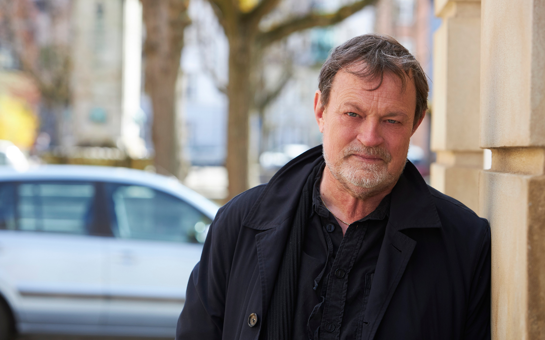- Bent Sørensen
St. Matthew Passion (2019)
- Edition Wilhelm Hansen Copenhagen (World)
Texts are quotes from the following authors:
Edith Södergran, Anna Akhmatova, Emily Dickinson, Søren Ulrik Thomsen, Ole Sarvig and Frank Jæger as well as The Bible/trad.
- 2(2pic).2(2obda).0.2/0.2.2.0/campane/double str
- double SATB
- SATB
- 1 hr 20 min
- Jakob Holtze, curator
Programme Note
Around 2014, it struck me: what I most wanted to compose was a St. Matthew Passion.
When you reach a certain age, you become aware, as a composer, that you will not be able to compose it all, that there is a limit. So, without telling anyone, possible commissioners, institutions, etc., I decided that everything I was going to compose from then on, was going to lead me to a St. Matthew Passion.
Obviously, that is not exactly how things happened. In the meantime, I composed many works that have nothing to do with a St. Matthew Passion; but in between my “main works”, there are a few smaller ones for choir, that I said yes to, because I could see them as steppingstones toward my goal.
Through these works – through these years – shape and moods for my Passion gradually took form, until I had enough steppingstones to announce I wanted to compose a Passion, that led to a co-commission between Oslo International Church Music Festival and the Danish National Symphony Orchestra. The world premiere was planned for 22. March 2020, but due to the pandemic, the world premiere will now be 12. March 2021.
In 2018, I was finally ready, having enough fragments to start the final work of my Passion, and I contacted Jakob Holtze and asked him to create a text for the work, based on many ‘hurdles’, wishes and fragments. Holtze had previously worked with my good friend and colleague, sadly now deceased, Sven-David Sandstrøm, and created the libretto for his St. John Passion.
The idea for my Passion was a journey, a sort of crucifixion. A journey in the mist – in and out of the light. A journey towards crucifixion, but even more a journey towards resurrection. I felt my own faith, a faith in resurrection, rather than death and crucifixion.
In the music – and in my choice of texts – lies a love passion. Not only Christ’s love declaration to all humankind, through crucifixion and resurrection, but also the simple and beautiful love. The passion for the people we love. The passion one feels for the one we love.
I had – as I mentioned – a feeling of journeying towards the Cross – travelling in and out of the mist. A feeling of looking to the sides, out far to see and read fragments of texts – like graffiti on buildings, house walls. Texts that would remind the wanderer of the situation – life, memories. Almost as when we listen to pop-song lyrics, that are about us, whilst in the middle of our passions – about falling in love, grief.
I also decided, together with Jakob Holtze – that the text should be in English with a few Latin passages (Crucifixus, Miserere, etc.), I had in fact already started looking for English texts with the word ‘mist’ during my steppingstones. I also decided that I didn’t want recitativi, like in Bach’s Passion when Matthew is present. In my Passion I have texts by Matthew, but I have primarily chosen texts by six poets, three women: Södergran, Akhmatova and Dickinson, and three Danish men: Frank Jæger, Ole Sarvig and especially the luminous (and my friend) Søren Ulrik Thomsen.
Based on my wishes, Holtze created exactly the text I was hoping for. Ten movements – from ‘In Veils of Mist’ – where we walk in the mist, to ‘Betania’, ‘Psalm’, ‘Wild Nights’, ‘Crucifixus’, ‘Lament’, ‘Tenebrae, ‘Magdalena’, ‘The Shore Againg’ – a circular journey with memories of the coast, the dark, love and crucifixion – towards ‘Into the mist’, where the journey again disappears with these final words by Søren Ulrik Thomsen: “…the sound of my footsteps goes on, into the mist’.
It is clear, when one composes a St. Matthew Passion, that one is working toward the unachievable. Bach’s St. Matthew Passion is maybe the greatest work of art in any genre ever to be created in our culture.
There are certainly shadows of Bach in this work, but only one hidden quote. When they sing “My God, my God, why have you forsaken me?”, Bach’s recitativo melody lies beneath my own.
Scores
Features

- New sacred Nordic Music
- Discover new sacred music by Nordic composer's who are refreshing the historical genre with contemporary passions, oratorios and gospels.
Reviews
Discography
More Info

- Oslo International Church Music Festival presents Bent Sørensen's 'St John Passion'
- 6th March 2025
- World Premiere of the first part of Bent Sørensen's 'St John Passion' at The Oslo International Church Music Festival by Ensemble Allegria and Theatre of Voices

 Located in the UK
Located in the UK
 Located in the USA
Located in the USA
 Located in Europe
Located in Europe